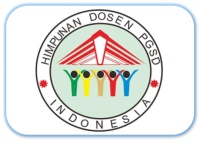Pengaruh Model Problem Based Learning terhadap Hasil Belajar FPB dan KPK di kelas IV SD
Abstract
This study aims to determine the effect of the Problem Based Learning model on learning outcomes of the Largest Fellowship Factor factor and the Smallest Multiples Fellowship grade IV in elementary schools. This research method is quantitative research, the type of research is Quasi Experimental Design with the design of The Nonequivalent Control Group Design. Sampling using purporsive sampling techniques. The instrument used was an objective test in the form of multiple choice. The data analysis technique used t-test obtained tcount> ttable namely 3.99> 1.67. This shows the learning outcomes of the material of the greatest common factor and the smallest multiple of the two classes significantly different. The increasing learning outcomes of the experimental class applying the Problem Based Learning model is 38.26 higher than the control class implementing conventional learning which is 19.35. It was concluded that there were differences in student learning outcomes using the Problem Based Learning model with student learning outcomes using a conventional approach to the material of the Largest Fellowship Factor and the Least Multiple Multiples in Class IV Elementary School.
Keywords
Full Text:
PDFReferences
Arifin, Z. (2017). Evaluais Pembelajaran. Bandung :PT Remaja Rosdakarya.
Aris Shaimin (2013). Model Pembelajaran Inovatif dalam Kurikulum2013.
Faisal. (2014). Sukses Mengawali Kurikulum 2013 di SD.Yogyakarta:IKAPI
Fitria, Yanti, dkk. (2018). The Effect Of Inquiry Learning, Toward 5th Grade Student’s Understanding On Sciences Based On Motivation In Padang. Jurnal Pendidikan Dasar dan Pembelajaran. 2 (2)
Kristian, Agus, dkk. (2017). The Effect Problem Based Learning Menthod On The Math Learning Of The IV SDN 18 Students of Banda Aceh, Indonesia. British Journal of Education. 5 (11).
Lestari, kurnia E., & Yudhanegara, M. R. (2017). Penelitian Pendidikan Matematika. Bandung: PT Refika Aditama.
Muhammad Fathurrohman (2015). Model-Model Pembelajaran Inovatif. Jakarta.
Putri, R. S., Suryani, M., & Jufri, L. H. (2019). Pengaruh Penerapan Model Problem Based Learning terhadap Kemampuan Pemecahan Masalah Matematika Siswa. Mosharafa: Jurnal Pendidikan Matematika, 8(2),
.
Sofyan, H., & Komariah, K. (2016). Pembelajaran Problem Based Learning Dalam Implementasi Kurikulum 2013 Di Smk. Jurnal Pendidikan Vokasi, 6(3), 260.
Sugiyono (2016). Metode Penelitian. Bandung:Alfabeta
Suparmin, dkk. (2016). Senang Belajar Matematika Buku Siswa Kelas IV SD/MI.Jakarta:Kemendikbud
Yusuf, A. Muri (2013). Metode Penelitian Kuantitatif, Kualitatif, dan Penelitian Gabungan. Padang.
DOI: http://dx.doi.org/10.24036/e-jipsd.v8i3.10449


